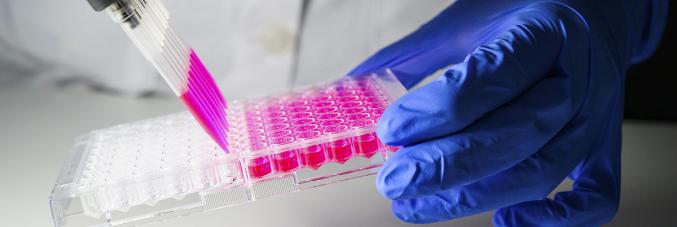
Telethon and Cariplo fund two Unipd projects on pituitary gland and Huntington's disease
27.11.2025
The Telethon and Cariplo Foundations are funding two research projects at the University of Padua with a total of 315 thousand euros. These projects are part of a call dedicated to the study of genes and proteins with unknown functions, known as "Tdark", aimed at promoting innovative research on rare diseases.
The first project, resulting from the collaboration between Gianluca Occhi, a professor in the Department of Biology at the University of Padua, and the project coordinator Giampaolo Trivellin from Humanitas University, focuses on the pituitary gland and the mechanisms regulating hormone production. Specifically, it will study the OTOS gene, which produces the protein otospiralin, potentially involved in conditions such as pituitary neuroendocrine tumours and X-linked acrogigantism. This study will use pituitary organoids derived from stem cells to better understand the role of OTOS and develop new diagnostic and therapeutic tools.
Gianluca Occhi explains, "Our project focuses on the OTOS gene, recently identified as a potential key player in these conditions. OTOS produces the protein otospiralin, present in the pituitary gland and particularly abundant in tumours that excessively produce growth hormone (GH) and prolactin (PRL). Our team aims to clarify the function of OTOS and its role in these diseases. Our goal is to transform this knowledge into diagnostic tools and, prospectively, targeted therapies. The collaboration with Humanitas allows us to combine complementary expertise and strengthen Padua's role in international biomedical research."
The second project, coordinated by Graziano Martello, a professor in the Department of Biology at the University of Padua, investigates the role of the Fbxo34 gene in Huntington's disease, a severe hereditary neurodegenerative disorder still lacking definitive treatments. The genetic disorder is caused by a gene mutation that leads to the production of a toxic protein (mHTT) capable of altering multiple cellular processes, including energy metabolism, redox homeostasis, and protein quality.
"Fbxo34 emerged as a gene of particular interest through a previous study of ours that identified it as a possible modulator of cellular protection mechanisms against the toxicity of the mHTT protein," explains Graziano Martello. "However, its function remains largely unexplored. The new project aims to clarify how Fbxo34 contributes to neuronal survival and which biological pathways it may control in the context of the disease. Our research group will study the impact of Fbxo34 on the molecular pathways altered in Huntington's, assessing whether this gene could represent a new target for innovative therapeutic interventions. The expected results could significantly expand the understanding of the mechanisms underlying neurodegeneration and pave the way for future treatment strategies."
With these projects, the University of Padua reaffirms its commitment to promoting cutting-edge biomedical research and contributing to improving patients' quality of life through scientific innovation.



